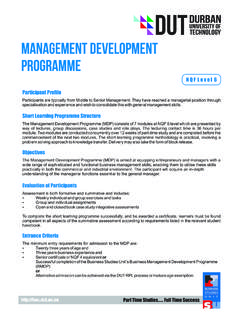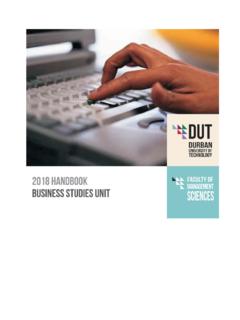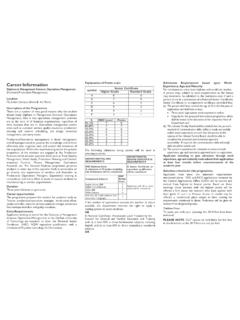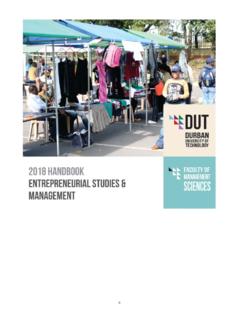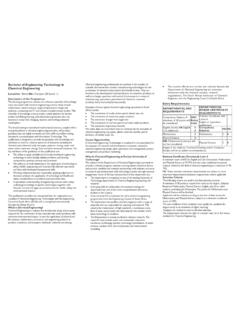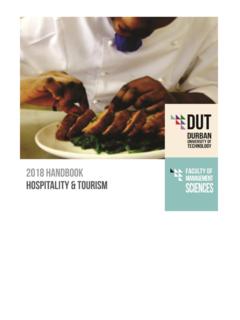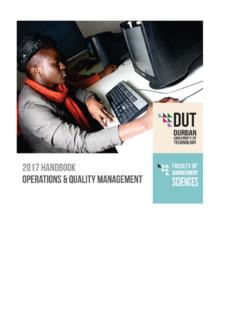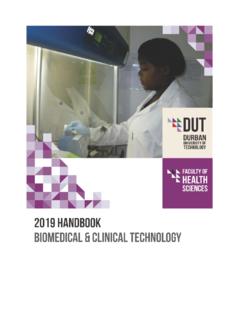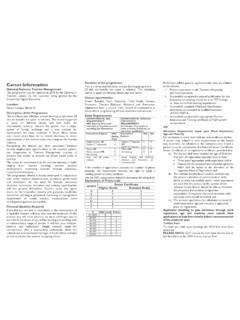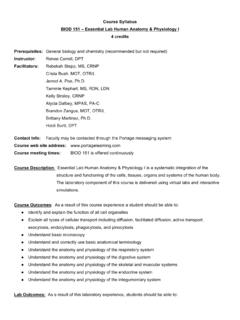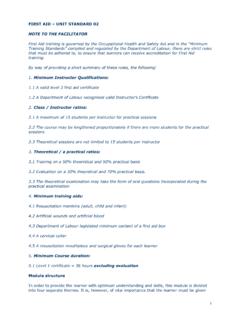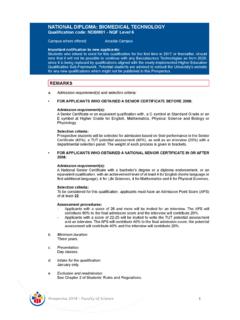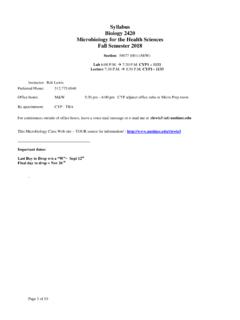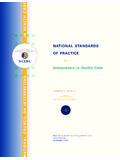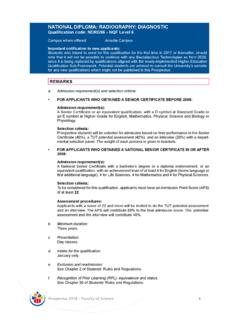Transcription of Career Information : No points are allocated for ten …
1 Career Information Bachelor of Health Sciences in Clinical Technology Location ML Sultan Campus (B Block 2nd Floor) Purpose of the programme The purpose of this qualification is to develop a learner to possess the necessary knowledge, skills, attitudes and values to practice as a Clinical Technologist, as a part of a multi-disciplinary team, in one of the following specialist categories: Cardiology, Cardiovascular Perfusion, Critical Care, Nephrology, Neurology, Pulmonology or Reproductive Biology. The qualifying learner will be able to independently perform diagnostic, therapeutic and corrective procedures on patients using specialised health technology and techniques for the treatment of patho- physiological conditions in a hospital-based or in a private practice setting.
2 This qualification will enable the learner to engage in research and contribute to the creation of new knowledge within the field. Lastly the qualification is designed to provide learners with specific clinical technology skills and competencies that are included in management and research. Upon completion of this qualification, the student will be able to: Apply scientific and technological knowledge to perform and monitor diagnostic, therapeutic and quality assurance procedures in the clinical environment for the management of patients in a field of specialisation in accordance with statutory and operational requirements.
3 Perform therapeutic, corrective and organ system support on patients using specialised health technology to facilitate management of the patient. Conduct research in a field of clinical technology in compliance with legislated and ethical research requirements. Demonstrate entrepreneurship and management skills in the health care facility to ensure professional, legal and ethical service delivery. Learning and Teaching strategies Our teaching, learning and assessment philosophies will be grounded in the following learning theories: cognitivist, constructivist, situated social learning, and constructive- development.
4 Strategies for learning and teaching will include, but not be limited to, theory lectures, group work and discussions, oral presentations, practical demonstrations and simulations, self and active learning, assignments, case studies, portfolios and tutorials in order to ensure that there is constructive alignment with the teaching, learning and assessment constructs, to meet the Exit Level Outcomes (ELO). In order to achieve the ELO as described above, the programme will be delivered full-time at DUT, with exposure to the clinical environment from first year to fourth year.
5 Registration with the Professional Board for Radiography and Clinical Technology Upon registration with Durban University of Technology for the programme: Bachelor of Health Sciences in Clinical Technology, it is mandatory that a student register as a Student Clinical Technologist with the Health Professions Council of South Africa as determined in the regulations set out in the Government Gazette (No. R1608 dated 24 July 1987). Career opportunities A Clinical Technologist can be employed in provincial and private hospitals in either Critical Care units, Lung Function units, Renal/Dialysis units, EEG and Sleep Laboratories, Cardio-thoracic surgery, Cardiac Catheterisation Laboratory & Cardiac Clinic or Assisted Reproductive Biology Laboratories.
6 Entry Requirements DEPARTMENTAL NSC REQUIREMENTS DEPARTMENTAL SENIOR CERTIFICATE REQUIREMENTS NSC Degree Entry A Senior Certificate or Equivalent Qualification Compulsory subjects NSC Rating Code Compulsory Subjects HG SG NCV English (Home) 4 English (Home) D B 70% English (1st additional) 4 English (1st additional) D B 70% Life Science 4 Life Science D B 70% Physical Science 4 Physical Science D B 70% Mathematics 4 Mathematics D B 70% And two 20 credit subjects (not more than one language 3 Table 2: Point Scores NSC Rating NSC Code Senior Certificate NC(V) HG SG 90 99% 8 8 6 4 80 89% 7 7 5 4 70 79% 6 6 4 4 60 69% 5 5 3 3 50 59% 4 4 2 40 49% 3 3 1 30 39% 2 2 0 29% 1 1 NOTE: No points are allocated for ten (10) credit subjects.)
7 Additional Entry Requirements: Applicants are required to have industrial knowledge and will have to undergo interviews. Students are admitted on the basis of academic merit which is assessed by converting Matriculation Certificate/NSC symbols into a point score. Applicants below that point score are not normally selected. This total may change from year to year, depending on the number and quality of application or changes in educational system of the country. Students satisfying the requirements may be required to appear before a Selection Committee and/or sit for an Aptitude Test Calculation of matriculation Point score for senior Certificate The point score is calculated by matching each of the six best matriculation subject symbols with relevant value listed either under higher grade [HG] or standard grade [SG] and then adding the scores to give the total.
8 Tuition Fees To assist you with your planning, the 2018 fees have been indicated. An increase for next year to accommodate the inflation rate can be expected. PLEASE NOTE: DUT cannot be held liable for the fees in this brochure as the 2018 fees are not yet final. Module title 2018 Fees Semester 1 (year 1) Anatomy R5 190 Community Health Care and Research 1 (E) R4 200 Chemistry R1 870 Introduction to Clinical Technology R1 750 Issues of Gender & Society in Health Care (E) R3 890 Physiology R3 010 Total R 38 630 Semester 2 (year 1) Cornerstone 101 (E) R2 600 Introduction to Technopreneurship R1 620 Instrumentation and Techniques for Clinical Technology I R3 000 Pathophysiology I R2 000 Physics (Module 1) R2 200 Physics (Module 2) R2 200 Violence and Non-violence R1 620 Total R 15 240 Semester 3 (year 2)
9 Applied anatomy and physiology ia R3 000 Equality and diversity R1 620 HIV and communicable diseases in kzn R1 730 Instr & tech for clin tech ii R3 000 Pharmacology R3 200 Research methodology i R3 000 Total R15 550 Semester 4 (year 2) Applied anatomy and physiology ib R3 600 Community health care and research ii R3 890 Clinical technology practice R3 000 Professional practice and management R3 600 Pathophysiology ii R3 000 Total R17 090 Closing Date for applications: 28 July 2018 CAO Code: DU-D-DCT G7 (3) Admission Requirements Based Upon Work Experience, Age and Maturity For admission to entry level degree studies: A person may, subject to such requirements as the Senate may determine, be ad-mitted if such a person is in possession of a National Senior Certificate, Senior Certificate or an equivalent certificate, but lacks the minimum requirements for admission to the degree provided that: (a) The person shall have reached the age of 23 in the first year of registration and shall have at least: Three years appropriate work experience.
10 And/or Capacity for the proposed instructional programme, which shall be assessed by a Senate-approved admission test; and the person has obtained (b) A conditional certificate of exemption from the Matriculation Board (when in possession of the Senior Certificate (SC)); OR has met (c) The requirements for Senate discretionary admission (when in possession of the NSC or equivalent), where Senate is satisfied the applicant has shown sufficient academic ability to ensure success, and that the person s standard of communication skills, and/or work experience are such that the person, in the opinion of the Senate, should be able to complete the proposed instructional programme successfully.
